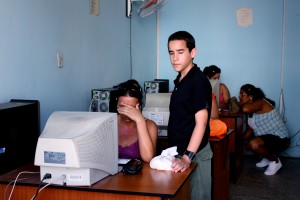The Disconnected Members of the Digital Generation
April 8, 2012 by ismoore
“So what’s life like with Facebook?”
The question popped up multiple times during my conversations with Cubans, particularly young Cubans of the so-called “Digital Generation.” Cubans have the lowest Internet access rate in the Americas: a mere 3% of the population can get online. Only select groups, such as University students and employees in the tourist industry, have permission to connect to the World Wide Web. The rest of the population relies on the Intranet, which allows them to send emails to other Cubans and to browse Cuban websites. This is quite expensive for most Cubans, and some choose to turn to the black market for broader Internet access. For those who do have access, the dial-up is frustratingly slow because Cuba uses satellite connection. Satellite connection limits bandwidth and buying bandwidth is incredibly costly to the government. Cuba’s Internet connection is thus the second slowest in the world, after Mayotte, a French territory in the Indian Ocean. The Cuban government blames the U.S trade embargo for its slow and minimal access because the U.S controls the fiber-optic cable that runs along Cuba’s northern coast.
But is the lack of Internet connection solely due to technical inadequacies or is there an aspect of political censorship involved as well? In 2009 President Obama authorized American companies to provide Internet services to Cuba but Cuba rejected the offer. Instead, Cuba turned to Venezuela with a plan to bring high-speed connection to the island via an underwater cable by the summer of 2011. This plan fell through due to “corruption” on the part of the Cuban government. Further, a Cuban court charged American Alan Gross last year with participating in a “subversive project of the U.S. government that aimed to destroy the Revolution through the use of communications systems out of the control of authorities.” He was arrested for trying to help Cuba’s Jewish community gain broader access to the Internet. Dissidents such as Yoani Sanchez, a cyber celebrity whose provocative blog “Generation Y” has gained her international recognition, believe that “authorities have always sought to control sources of information and free expression.” While limited technology may be partly to blame for the low percentage of Cubans getting online, there is evidence that the Cuban government is also wary of the counterrevolutionary discourse that could prevail through widespread Internet coverage.
Many Cubans feel that the Internet shortage has left them out of the rest of the world—a world that is quickly “flattening” through communication only made possible through digital connection. It is true that Cuban researchers, scientists, and professional scholars are easily excluded from international studies. Artists and musicians also have a hard time reaching an international audience. The hip-hop group Hermanazos told us during a conference in Havana that limited Internet access was “like not being in the world.” Yet despite the obvious benefits of having Internet connection, many Americans crave the opposite: freedom from constant text messages, emails, tweets, and Facebook notifications. When a dancer at Rosario Cárdenas in Havana asked us, “Is Facebook really as good as it seems?” we assured her that life with Facebook has its setbacks: too much connection, too much hiding behind a carefully constructed image of oneself, too little genuine human interaction. Many American kids complain about Facebook taking over their lives and they delete their profiles in a fury of rebellion. Phone companies now advertise their products by flaunting how little time a person must spend on the device. The Microsoft Windows Phone 7 is supposed to be a “phone that saves us from our phones…designed to get you in and out and back to life.” A 2010 television commercial pokes fun at the American obsession with digital connection:
From this perspective it is worth considering what benefits Cubans have reaped from lack of Internet access. As Yoél pointed out, lack of access in schools has made Cubans completely dependent on their brains for knowledge. In America, we have grown accustomed to quickly “Googling” information if we can’t remember it. “Google Translate” is a favorite website for students in foreign language classes. Cuban students have to strengthen their memories in ways that American students do not. A bookstore owner in Cienfuegos told us he relies on books and interactions with tourists in order to learn about other cultures. He is keen on establishing genuine relationships as an alternative to the Internet. Many Americans dream of this disconnected and “simpler” world where living encounters and paper books are the ultimate sources of knowledge and experience.
Yet this may be groundless wishful thinking. After explaining to a teenage boy on the Malecón that the Internet in America cultivates shallow, “fake” relationships, he quickly assured us that façades and personality fronts are not unique to countries with Internet. He explained that the black market culture, along with extreme desires for material goods, spurs distrust and scheming among Cubans.
I believe that Cubans deserve the widespread Internet access that many Americans take for granted and I do not want to mitigate the clear advantages of online connection. However, given our over-dependence on the digital world, it is worth considering Cuba’s situation in an alternate, positive light. Neither world is as perfect as the other side makes it out to be. We Americans found liberation and comfort in one of the Cubans’ greatest frustrations, and one of our greatest frustrations is something many Cubans yearn for on a daily basis.
References:
http://www.npr.org/2011/12/14/143721874/in-cuba-dial-up-internet-is-a-luxury
http://www.nytimes.com/2012/03/21/opinion/release-alan-gross.html
http://www.economist.com/node/18285798
http://www.bbc.co.uk/news/world-latin-america-12411845
http://www.sun-sentinel.com/news/nationworld/sfl-cuba-internet-cutoff-050709,0,4376220.story
Leave a Reply
You must be logged in to post a comment.
